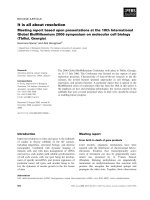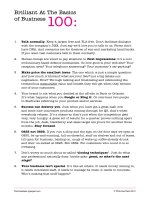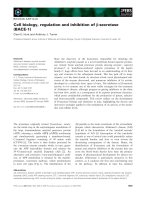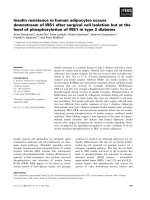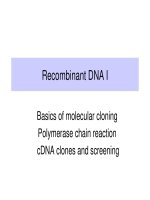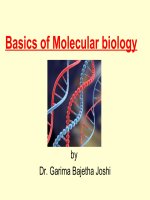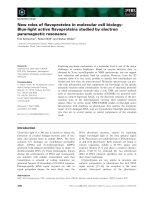molecular cell biology 1 basics of molecular biology_2
Bạn đang xem bản rút gọn của tài liệu. Xem và tải ngay bản đầy đủ của tài liệu tại đây (5.34 MB, 80 trang )
Course in Molecular Biology
Leuven, October – November 2002
Program
I. Basics of molecular biology
II. Transcription
III. Translation
IV. Regulatory pathways
V. DNA and diseases
VI. Biotechnology
Lesson 1: Basics of molecular biology
I. The Cell’s Organization
II. Cell Cycle and Cell Division
III. Cellular Molecules
IV. The Genetic Dogma
The Cell’s Organization
All organisms: 1 or more cells
PROKARYOTESEUKARYOTES
The animal cell
A plant cell
A bacterium
The Main Functions of the Membrane-bounded
Compartments of a Eukaryotic Cell
Compartment Main Function
Cytosol contains many metabolic pathways
protein synthesis
Nucleus contains main genome
DNA and RNA synthesis
Endoplasmic reticulum
(ER)
synthesis of most lipids
synthesis of proteins for distribution to many organelles and plasma
membrane
Golgi apparatus modification, sorting, and packaging of proteins and lipids
for either secretion or delivery to another organelle
Lysosomes intracellular degradation
Endosomes sorting of endocytosed material
Mitochondria ATP synthesis by oxidative phosphorylation
Chloroplasts (in plant
cells)
ATP synthesis and carbon fixation by photosynthesis
Peroxisomes oxidation of toxic molecules
Compartimentation of the eukaryote cell:
various organelles
Cell nucleus
Contains genetic information: DNA
Nucleolus:
Ribosome building machine
Protein factories
in the cytoplasm
Each human cell contains 46 chromosomes (except sperm or egg cells)
Chromosomes
in a cell that is about to divide
Mitochondria:
factories of energy
glucose
O
2
P
i
ADP
ATP
H
2
O
CO
2
The endoplasmic reticulum
smooth (metabolism+synthesis of lipids)
rough (protein synthesis)
The Golgi apparatus
cis
trans
medial
→ processing of secretory proteins
→ sorting cellular proteins
Inside the cytosol:
the cytoskeleton
“microtubules”
maintainance of cell shape and mobility
ancor for other cellular structures
Presentation:
DNA
Cell Cycle and Cell Division
Some Eukaryotic Cell-Cycle Times
Cell Type Cell-Cycle Times
Early frog embryo cells 30 minutes
Yeast cells 1.5-3 hours
Intestinal epithelial cells about 12 hours
Mammalian fibroblasts in culture about 20 hours
Human liver cells about 1 year
The eukaryotic cell cycle
Separation of sister chromatides during mitosis
(mitosis = normal cell division)
Microtubuli:
assist chromosomes during cell division (mitosis)
Different stages of the M phase during cell division (mitosis)
The three DNA sequence elements needed to produce a eukaryotic
chromosome that can be replicated and then segregated at mitosis
